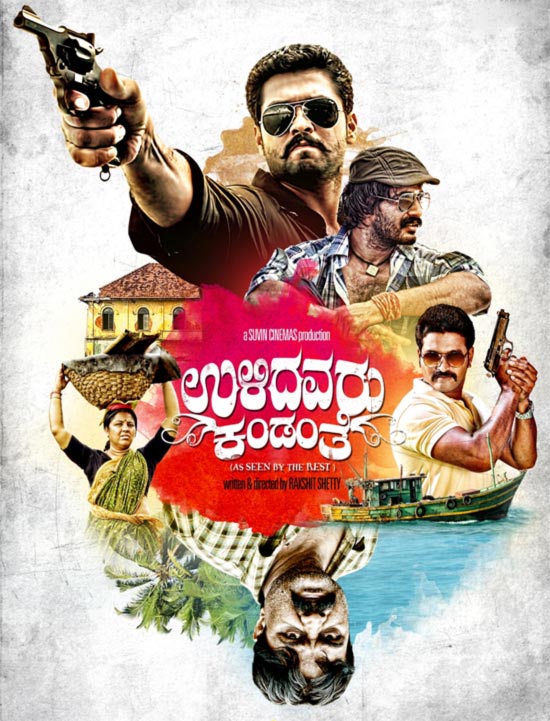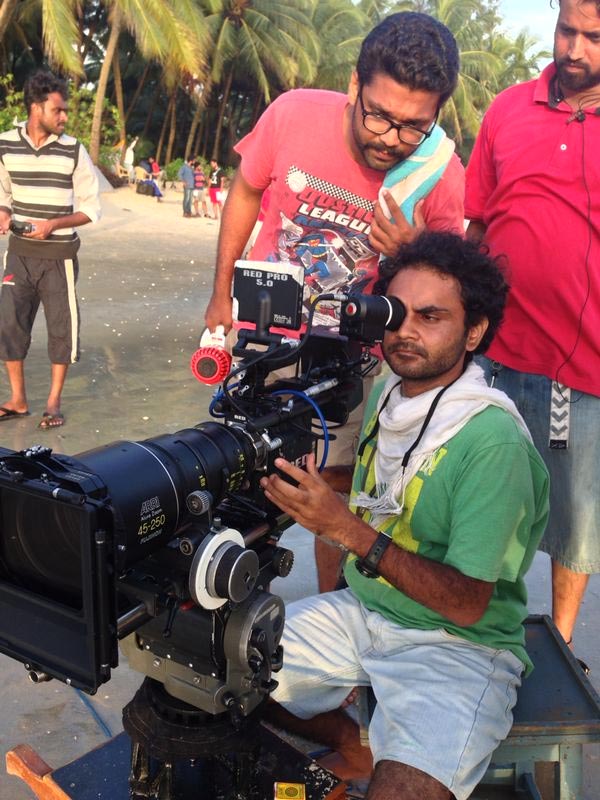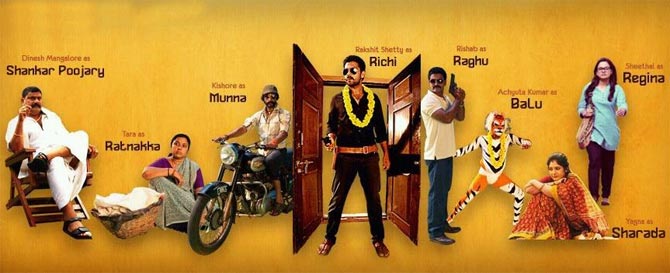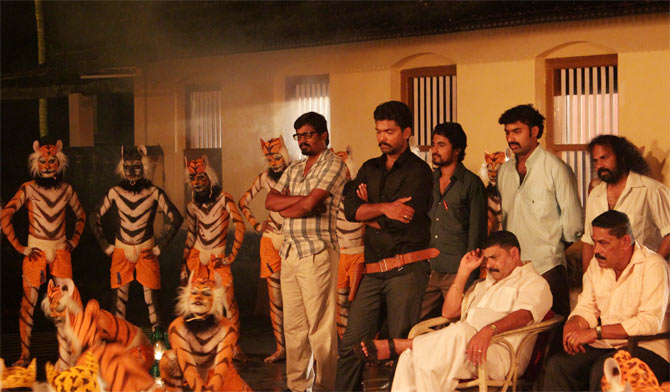 | « Back to article | Print this article |
'Shooting Ulidavaru Kandanthe was a challenge'
Karm Chawla, the cinematographer of Ulidavaru Kandanthe is from Delhi. After graduating in English from Delhi University, his interest in cinematography took him to the LV Prasad Film and TV Academy in Chennai.
After a two-year course in cinematography, he started off as an intern on the sets of Rajkumar Gupta’s No One Killed Jessica and then worked with cinematographer Bobby Singh.
He was a part of the crew of films such as Dirty Picture, Jannat 2, Luv Shuv Te Chicken Khurana, and Special 26.
He talks to rediff.com about his experience and learning’s from shooting Ulidavaru Kandanthe.
We have seen talented cinematographers from south India working in Hindi films; you are from north India and working in the south. How do you see the options for cinematographers today?
There are so many interesting scripts everywhere. Every cinematographer has these different stages in his life where at one point he wants to do glamour work, commercial films, and another time, real meaningful cinema that will challenge him.
I enrolled at the LV Prasad Film School in Chennai only because I am impressed with cinema from the south.
I have been heavily influenced by Rajeev Ravi and Santosh Sivan.
When Dil Se… released, I did not know anything about what a cinematographer does. I held a still camera only after I got into the film course. I am not someone who grew up as a photographer.
Not that I am against Bollywood; if a good script comes to me from there, I am game. But Bollywood is not my priority.
Is Ulidavaru Kandanthe your debut film?
In a way, yes. But I have shot an experimental Kannada film in 7D called B.E. Mech.
'The characters in the film are like the five elements of nature'
How did you end up as a cinematographer of Ulidavaru Kandanthe?
The guy who did music for B.E. Mech, Sai Kiran, is known to actor Rakshit and he told me that he was looking for a cameraman.
I had no idea who Rakshit was but I went and met him. On the first meeting, Rakshit told me the story.
The second time we met, we watched Bombay Talkies, and then sat at McDonald’s for an hour and a half and just talked about movies.
After we started talking about how we wanted to treat the script I realised that Rakshit was someone who would want something visual.
How did you approach the script visually?
To start with I got a lot of inputs from Rakshit. The characters in the film are like the five elements of nature. Like Balu -- the character that Achyuth Kumar plays is always surrounded by a crow. I suggested that we shoot his portions with a handheld cam.
Rishab’s character is connected to the ocean. We gave his scenes a little more blue and shot it with a lot of pan.
Tara’s character is connected to earth and her chapter falls in the night; so we gave a yellowish-blue tone to it and we used a steady cam for her portions.
We gave Kishore’s chapter a white tone, a ghostly kind of feel, and we shot it in blocks. We also had to make Richie’s chapter more stylish. We tried small nuances to differentiate the chapters.
We were very clear that we did not want to light the different chapters in different distinctive tones like many other films of the past, but do it subtly.
'During the filming of Ulidavaru Kandanthe, I lived in Bangalore and saw some Kannada films'
What were the challenges you faced shooting such a film?
To be very honest, I would say that even for a very experienced cameraman who is well organised, Ulidavaru Kandanthe would have been quite a challenge.
That is mostly because of the coastal weather conditions; it would rain suddenly, and the lighting would keep changing.
I remember we took three days to shoot a cricket match scene because the weather was disrupting the shoot. It was a mammoth task that way.
Coming from the north, how familiar were you with Kannada films? Have you watched any?
I have watched very few. During the filming of Ulidavaru Kandanthe, I lived in Bangalore and got to watch some Kannada films.
I watched Ninnindale, then Lucia, which I thought was brilliant! I really want to watch Jatta. I somehow missed it.
'Rakshit and the producers were very supportive'
What was it like working with Rakshit?
Rakshit and the producers were very supportive. Right from the start whatever equipment I asked for was given to me.
Be it a cameraman, music director or anybody, the only way he can do justice to his work is when he has support from his director and producer.
There are constraints, be it a 100 crore film or a five crore film, and we worked around it together.
Who are your favourite cinematographers?
Ah that’s a huge list! I cherish meeting V K Murthy Sir, then like I said, Santosh and Rajeev Ravi.
Then there is Vittorio Storaro, Christopher Doyle and many others. I like different cinematographers for different reasons. When I am shooting, all of them play back in my mind.
Are there any particular directors that you want to work with?
Again, that’s a huge list. Mani Ratnam, Anurag Kashyap.
I loved Ameer’s Paruthiveeran. That film is a big inspiration in the way he treated it; I loved its rawness.



